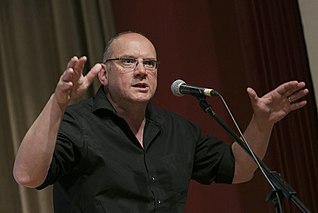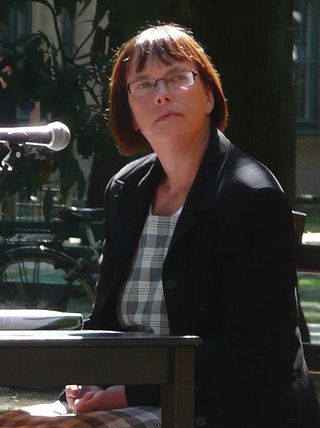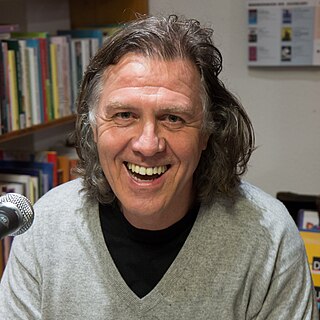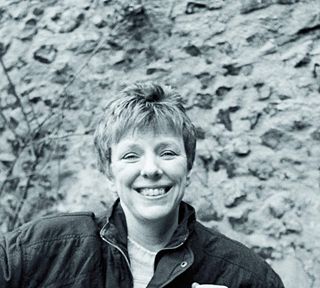
Katja Lange-Müller is a German writer living in Berlin. Her works include several short stories and novellas, radio dramas, and dramatic works.

Sibylle Berg is a German-Swiss contemporary author and playwright. They write novels, essays, short fiction, plays, radio plays, and columns. Their 16 books have been translated into 30 languages. They have won numerous awards, including the Thüringer Literaturpreis, the Bertolt-Brecht-Literaturpreis, and the Johann-Peter-Hebel-Preis. They have become an iconic figure in German alternative sub-cultures, gaining a large fan base among the LGBT community and the European artistic communities. They live in Switzerland and Israel. Their 2019 work GRM. Brainfuck, a science fiction novel set in a dystopian near future won the Swiss Book Prize and was noticed by The Washington Post, and reached fourth place on the Spiegel Bestseller list, with the sequel, RCE, entering the list as highest entry of the week at place 14. On 1 March 2023 Berg was invited as special guest to open the high-profile Elevate Festival in Graz.

Karen Duve is a German author. After secondary school, she worked as a proof-reader and taxi driver in Hamburg. Since 1990 she has been a freelance writer.

Thomas Hettche is a German author.
Josef Wilhelm Janker was a German author and World War II veteran.

Matthias Zschokke is a Swiss writer and filmmaker.

Guy Helminger is a Luxembourgish author who has written a number of successful novels and plays in German.
Rheingau Literatur Preis is a literary prize of Hesse. It is awarded annually since 1994 by the Rheingau Literatur Festival which follows the Rheingau Musik Festival. An author is awarded whose prose gained the attention of the literary critics
Dietrich Schwanitz was a German writer and literary scholar. He became known to larger audiences after publishing the bestselling campus novel Der Campus in 1995.

Mirko Bonné is a German writer and translator.

Silke Scheuermann is a German poet and novelist. She was educated in Frankfurt, Leipzig, and Paris. She is best known for her debut novel Die Stunde zwischen Hund und Wolf, which has been translated into ten languages including English. She has won numerous German and European literary prizes and fellowships, including the Georg-Christoph-Lichtenberg-Preis, the Leonce-und-Lena-Preis, the Hölty Prize, the Bertolt-Brecht-Literaturpreis, and a Villa Massimo fellowship.

Iris Hanika is a German writer. She was born in Würzburg, grew up in Bad Königshofen and has lived in Berlin since 1979, where she studied Universal and Comparative Literature at the FU Berlin. She was a regular contributor to German periodicals like Frankfurter Allgemeine Zeitung and Merkur. Hanika won the LiteraTour Nord prize and the EU Prize for Literature for her novel Das Eigentliche. In 2020, she was awarded the Hermann-Hesse-Literaturpreis for her novel Echos Kammern. In 2021, she won the Leipzig Book Fair Prize. Hanika wrote previously mainly short non-fictional texts, later novels, including two books on psychoanalysis.

Gerd Koenen is a German historian and former communist politician.

Kathrin Schmidt, is a German writer. She is known both for her poetry and prose.

Norbert Scheuer is a German author.

Burkhard Spinnen is a German author.

Eva-Ruth Weissweiler is a German writer, musicologist and non fiction writer.

Peter Kurzeck was a German writer.

Robert Schindel is an Austrian lyricist, director and author.
Irina Liebmann is a German journalist-author and sinologist of Russo-German provenance. She has won a number of important literary prizes: the most significant of these, probably, was the 2008 Leipzig Book Fair non-fiction Prize, awarded for "Wäre es schön? Es wäre schön!", a biography of her father, a noted anti-Nazi activist and political exile in Warsaw and Moscow who, after 1945, returned to what became, in 1949, the German Democratic Republic and in 1953, despite his longstanding record of communist activism, emerged as an uncompromising critic of the East German leader Walter Ulbricht: he was expelled from the party and suffered various other government mandated public indignities. She grew up and lived the first part of her adult life in the German Democratic Republic, but succeeded in moving to West Berlin during 1988, thereby anticipating reunification by more than a year.
















